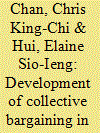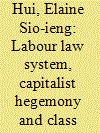|
|
|
Sort Order |
|
|
|
Items / Page
|
|
|
|
|
|
|
| Srl | Item |
| 1 |
ID:
131958


|
|
|
|
|
| Publication |
2014.
|
| Summary/Abstract |
2010 was a turbulent year for labour relations in China. The wave of strikes sparked by the Honda workers has highlighted the urgent need for trade union reform and workplace collective bargaining. In response to this turbulence, the Chinese government has stepped up efforts to promote the practice of collective bargaining, which had been neglected under the existing "individual rights-based" labour regulatory framework. In the midst of rapid social and policy changes, this article aims to examine the effect of labour strikes on the development of collective bargaining in China. The authors argue that, driven by growing labour protests, the collective negotiation process in China is undergoing a transition, from "collective consultation as a formality," through a stage of "collective bargaining by riot," and towards "party state-led collective bargaining." This transition, however, is unlikely to reach the stage of "worker-led collective bargaining" in the near future.
|
|
|
|
|
|
|
|
|
|
|
|
|
|
|
|
| 2 |
ID:
144542


|
|
|
|
|
| Summary/Abstract |
Through an investigation of the Shenzhen Collective Consultation Ordinance and the Guangdong Regulations on the Democratic Management of Enterprises, this article demonstrates how transnational capital in China deploys its associational power alongside its structural economic power to lobby and pressure the national and local governments to advance its own interests. In addition, building upon the ideas of Hall and Soskice about the varieties of capitalism, the authors have developed the concept of “varieties of transnational capital” to account for the differing positions of overseas business associations regarding the two laws. We find that these positions are shaped by two determining factors: a) where the associations are situated in global production chains, and b) the industrial relations model in their home countries.
|
|
|
|
|
|
|
|
|
|
|
|
|
|
|
|
| 3 |
ID:
146516


|
|
|
|
|
| Summary/Abstract |
This article investigates how the Chinese labour law system has helped to reproduce capitalist hegemony, i.e. the ethico-political, moral and cultural leadership of the ruling class. Based on intensive fieldwork in the Pearl River Delta and 115 interviews with migrant workers, this article shows that the labour law system has exercised a double hegemonic effect with regards to capital–labour relations and state–labour relations. Through normalizing, countervailing, concealing and transmuting mechanisms, the labour law system has been able to buffer both the market economy and the party-state from workers’ radical and fundamental criticism. However, the double hegemony mediated through the labour law system has influenced the Chinese migrant workers in an uneven manner: some of them have granted active consent to the ruling class leadership; some have only rendered passive consent; and some have refused to give any consent at all.
|
|
|
|
|
|
|
|
|
|
|
|
|
|
|
|
|
|
|
|
|